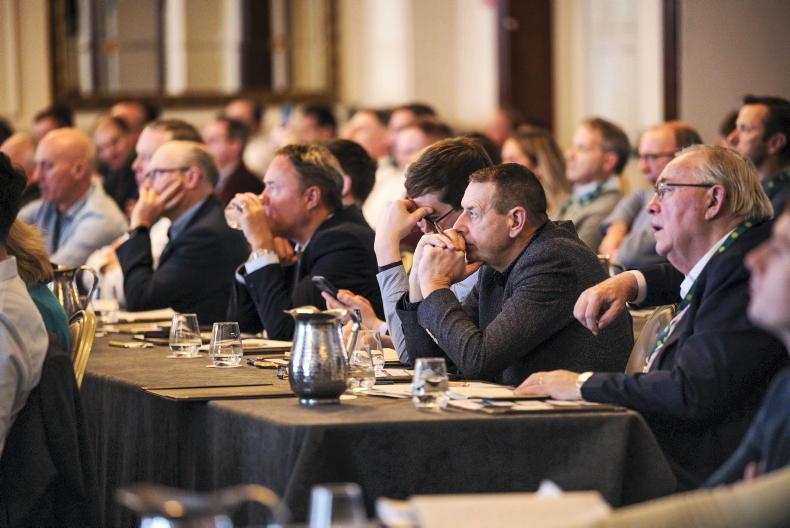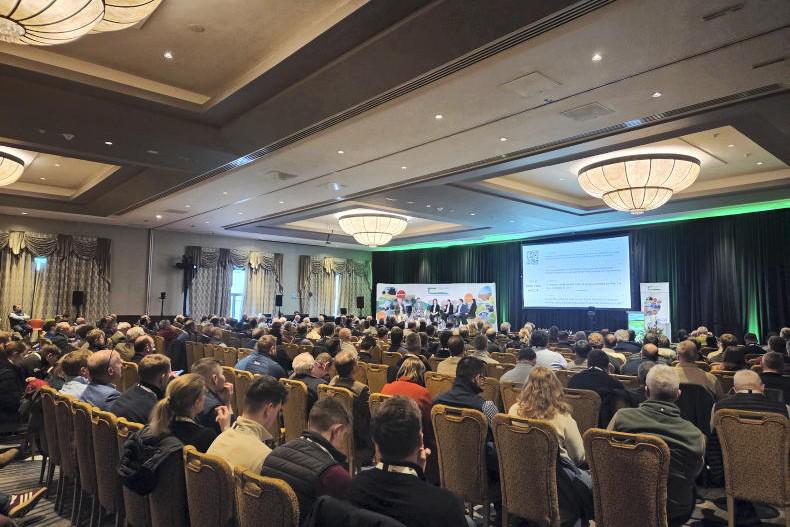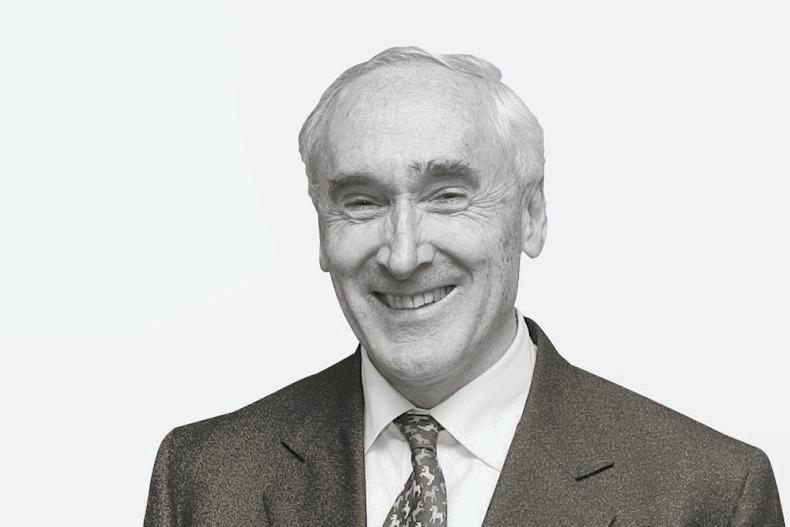Political theatre is certainly alive and well with the ongoing “Punch and Judy” show between Minister for Agriculture, Charlie McConalogue and Minister for Environment, Eamon Ryan, on emission reduction targets attracting top billing across the national media this weekend.
The lack of consensus across media titles as to how the “play will end” merely demonstrating the extent to which the PR machines behind each Minister are working overtime to try and position their team as having “put up a good fight” when the dust settles.
We also have the introduction of a phony deadline, in the form of Wednesday’s cabinet meeting, just to give an added layer of drama.
Unfortunately for farm families, this is a play where the only guarantee is that there will be no happy ending. Whether set at 22% or at 30%, Irish farmers will be left to pick up a multibillion euro annual price tag to decarbonise food production for EU consumers.
In this regard, it has been a complete failure by the sector to allow what is clearly a debate on decarbonisation of food production continue to be positioned by politicians and vested interest groups as the decarbonisation of “agriculture”.
Of course it is easy to sell to the public the benefits of decarbonising the transport and energy sectors when the outcome is better public transport and more pedestrianised streets alongside cosy warm houses and lower home heating bills.
What is much more difficult is communicating to the public the opportunities that exist from decarbonising what is conveniently referred to as the “agricultural sector”. It is convenient in the sense that most of the public see themselves as totally disconnected from agriculture and therefore not impacted by whatever demands are made of it.
Whether set at 22% or at 30%, Irish farmers will be left to pick up a multibillion euro annual price tag to decarbonise food production for EU consumers.
Would the same be true if the debate instead centered on the impact of decarbonising “food production” and how they consume food? In contrast to the good news story of transport and energy, such a move would force those advocating for a sharp reduction in Ireland's food production capacity to have a much broader discussion with what would be a much more engaged public: One that would start with an honest conversation around who is going to carry the cost of decarbonising food production.
Economic impact
As highlighted by the KPMG report commissioned by the Irish Farmers Journal, the economic impact on rural Ireland of reducing emissions from food production by 30% would be €3.8 billion with the loss of over 50,000 jobs.
To contend that this cost would not be reflected in higher food prices makes no sense. But of course selling higher food prices to a consumer base that in recent months has proven hugely sensitive to food price inflation would be much more of a challenge than selling warmer houses and pedestrianised streets.
Focusing the debate on food production rather than agriculture would also expose the lack of logic in reducing livestock-based food production capacity in Ireland - one of the most carbon efficient food production systems in the world - at a time when global food demand is set to rise.
It is convenient for those that are effectively advocating tougher emission reduction targets on food production in Ireland to ignore the fact that the UN Food and Agriculture Organisation forecast demand for sheep meat, beef and dairy to increase by 2.2, 4.6 and 94.5 million tonnes respectively between now and 2030.
Negative global impact
In this context, the environmental dividend from scrapping a diesel powered car in Ireland and moving to an electric one is very different from culling a cow. Both may serve to achieve a territorial emission reduction target but only the car scenario delivers on the ambition to reduce global emissions.
In contrast, culling an Irish cow has a negative global impact as market demands simply push production to more carbon intensive systems practiced in other parts of the world. If the Government was to adopt the same approach/logic to the Irish aviation sector as it is to agriculture, it would cap or reduce the number planes owned by Ryanair only for other airlines to grow capacity.
Likewise by focusing the debate on the agriculture sector rather than food production deflects from the extent to which the war in Ukraine has completely destabilised global food security and exposed flaws in the EU policy of offshoring energy and food security – a fact recognised by EU Commissioner for Agriculture, Janusz Wojciechowski when he acknowledged the need to revise the EU’s environmental ambition against the need to protect global food security.
We should not ignore the similarities as to what is playing out today in Ireland and what happened in Germany back in 2011. Under intense pressure from the Green lobby, German Chancellor Angela Merkel committed to phasing out 17 nuclear power plants by 2022 - which then accounted for 25% of the country’s electricity supply.
The plan - to ramp up renewable energy sources to bridge the gap. The reality - energy production was simply outsourced to Russia. The outcome - one of the most developed economies in the world is now heading into a winter of energy rationing amid soaring costs. It is one of the clearest examples of how policies that are formed around idealism rather than realism fail both the environment and society.
Driven by idealism
Like in Germany, the Irish government used the deadline of the summer recess last year to sign into law a Climate Act that was driven by idealism - signing the country up to a legally binding commitment to reduce emissions by 51% by 2030 and to achieve net zero by 2050. It was done in the complete absence of any clear pathway for delivery or modelling around the economic impact.
Twelve months on and no pathway has yet been developed nor any clear economic modelling or financial framework presented. Instead Minster Ryan and others continue to present a utopian vision for the future of Irish farming in the complete absence of any financial data.
However, unlike last year when the focus was on the voting decision of 160 TDs, the focus this time is very much on one man - Minister for Agriculture, Charlie McConalogue. The reality is that whatever target is set for the sector it will be forever owned by Minister McConalogue. While there may be an understandable temptation by the Minister to exceed to pressure from his cabinet colleagues, his core responsibility is to the sector which he represents. This responsibility extends to ensuring:
Emission reduction targets set for the agriculture sector are scientifically robust and that flaws identified in the Carbon Dioxide Equivalent (Co2e) accounting methodology are taken into accountThat the financial impact of any emission reduction target on farmers' livelihoods gives regard to climate justice and the Just TransitionProper regard is given in relation to carbon leakageThat emission reduction targets are aligned with Ireland's commitment to protect food security under Article 2 of the Paris Agreement That future agriculture policy will not be set through the courts by signing up to an unachievable - but legally binding - emission reduction target That any emission reduction target set for the sector comes with a detailed economic impact assessment alongside an implementation plan that maintains agricultural output and protects farmers' livelihoods. In advance of heading to the hills of Donegal for his summer break, signing farmers up to a target that he knows can only be achieved by destabilising the sector, merely to deliver what is an idealistic national target that will do nothing to actually address the true challenge of reducing the environmental footprint of feeding a rising world population, would be throwing the farming community to the wolves that Eamon Ryan seeks to have reintroduced into the country.
Political theatre is certainly alive and well with the ongoing “Punch and Judy” show between Minister for Agriculture, Charlie McConalogue and Minister for Environment, Eamon Ryan, on emission reduction targets attracting top billing across the national media this weekend.
The lack of consensus across media titles as to how the “play will end” merely demonstrating the extent to which the PR machines behind each Minister are working overtime to try and position their team as having “put up a good fight” when the dust settles.
We also have the introduction of a phony deadline, in the form of Wednesday’s cabinet meeting, just to give an added layer of drama.
Unfortunately for farm families, this is a play where the only guarantee is that there will be no happy ending. Whether set at 22% or at 30%, Irish farmers will be left to pick up a multibillion euro annual price tag to decarbonise food production for EU consumers.
In this regard, it has been a complete failure by the sector to allow what is clearly a debate on decarbonisation of food production continue to be positioned by politicians and vested interest groups as the decarbonisation of “agriculture”.
Of course it is easy to sell to the public the benefits of decarbonising the transport and energy sectors when the outcome is better public transport and more pedestrianised streets alongside cosy warm houses and lower home heating bills.
What is much more difficult is communicating to the public the opportunities that exist from decarbonising what is conveniently referred to as the “agricultural sector”. It is convenient in the sense that most of the public see themselves as totally disconnected from agriculture and therefore not impacted by whatever demands are made of it.
Whether set at 22% or at 30%, Irish farmers will be left to pick up a multibillion euro annual price tag to decarbonise food production for EU consumers.
Would the same be true if the debate instead centered on the impact of decarbonising “food production” and how they consume food? In contrast to the good news story of transport and energy, such a move would force those advocating for a sharp reduction in Ireland's food production capacity to have a much broader discussion with what would be a much more engaged public: One that would start with an honest conversation around who is going to carry the cost of decarbonising food production.
Economic impact
As highlighted by the KPMG report commissioned by the Irish Farmers Journal, the economic impact on rural Ireland of reducing emissions from food production by 30% would be €3.8 billion with the loss of over 50,000 jobs.
To contend that this cost would not be reflected in higher food prices makes no sense. But of course selling higher food prices to a consumer base that in recent months has proven hugely sensitive to food price inflation would be much more of a challenge than selling warmer houses and pedestrianised streets.
Focusing the debate on food production rather than agriculture would also expose the lack of logic in reducing livestock-based food production capacity in Ireland - one of the most carbon efficient food production systems in the world - at a time when global food demand is set to rise.
It is convenient for those that are effectively advocating tougher emission reduction targets on food production in Ireland to ignore the fact that the UN Food and Agriculture Organisation forecast demand for sheep meat, beef and dairy to increase by 2.2, 4.6 and 94.5 million tonnes respectively between now and 2030.
Negative global impact
In this context, the environmental dividend from scrapping a diesel powered car in Ireland and moving to an electric one is very different from culling a cow. Both may serve to achieve a territorial emission reduction target but only the car scenario delivers on the ambition to reduce global emissions.
In contrast, culling an Irish cow has a negative global impact as market demands simply push production to more carbon intensive systems practiced in other parts of the world. If the Government was to adopt the same approach/logic to the Irish aviation sector as it is to agriculture, it would cap or reduce the number planes owned by Ryanair only for other airlines to grow capacity.
Likewise by focusing the debate on the agriculture sector rather than food production deflects from the extent to which the war in Ukraine has completely destabilised global food security and exposed flaws in the EU policy of offshoring energy and food security – a fact recognised by EU Commissioner for Agriculture, Janusz Wojciechowski when he acknowledged the need to revise the EU’s environmental ambition against the need to protect global food security.
We should not ignore the similarities as to what is playing out today in Ireland and what happened in Germany back in 2011. Under intense pressure from the Green lobby, German Chancellor Angela Merkel committed to phasing out 17 nuclear power plants by 2022 - which then accounted for 25% of the country’s electricity supply.
The plan - to ramp up renewable energy sources to bridge the gap. The reality - energy production was simply outsourced to Russia. The outcome - one of the most developed economies in the world is now heading into a winter of energy rationing amid soaring costs. It is one of the clearest examples of how policies that are formed around idealism rather than realism fail both the environment and society.
Driven by idealism
Like in Germany, the Irish government used the deadline of the summer recess last year to sign into law a Climate Act that was driven by idealism - signing the country up to a legally binding commitment to reduce emissions by 51% by 2030 and to achieve net zero by 2050. It was done in the complete absence of any clear pathway for delivery or modelling around the economic impact.
Twelve months on and no pathway has yet been developed nor any clear economic modelling or financial framework presented. Instead Minster Ryan and others continue to present a utopian vision for the future of Irish farming in the complete absence of any financial data.
However, unlike last year when the focus was on the voting decision of 160 TDs, the focus this time is very much on one man - Minister for Agriculture, Charlie McConalogue. The reality is that whatever target is set for the sector it will be forever owned by Minister McConalogue. While there may be an understandable temptation by the Minister to exceed to pressure from his cabinet colleagues, his core responsibility is to the sector which he represents. This responsibility extends to ensuring:
Emission reduction targets set for the agriculture sector are scientifically robust and that flaws identified in the Carbon Dioxide Equivalent (Co2e) accounting methodology are taken into accountThat the financial impact of any emission reduction target on farmers' livelihoods gives regard to climate justice and the Just TransitionProper regard is given in relation to carbon leakageThat emission reduction targets are aligned with Ireland's commitment to protect food security under Article 2 of the Paris Agreement That future agriculture policy will not be set through the courts by signing up to an unachievable - but legally binding - emission reduction target That any emission reduction target set for the sector comes with a detailed economic impact assessment alongside an implementation plan that maintains agricultural output and protects farmers' livelihoods. In advance of heading to the hills of Donegal for his summer break, signing farmers up to a target that he knows can only be achieved by destabilising the sector, merely to deliver what is an idealistic national target that will do nothing to actually address the true challenge of reducing the environmental footprint of feeding a rising world population, would be throwing the farming community to the wolves that Eamon Ryan seeks to have reintroduced into the country.










SHARING OPTIONS